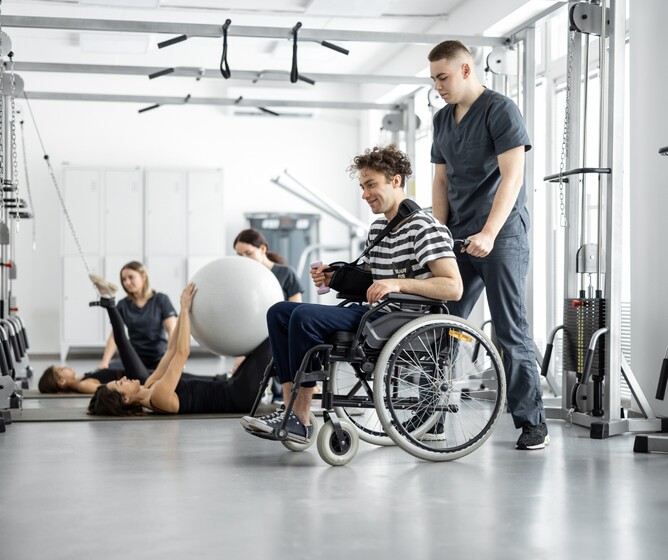Unlocking Potential: The Impact of Exercise Physiology on Disability Rehabilitation
Exercise physiology plays a pivotal role in the rehabilitation of individuals with disabilities by improving physical function, mobility, and overall well-being. As a branch of health science that studies the body’s responses and adaptations to exercise, it helps individuals with disabilities unlock their potential and regain independence. Exercise physiologists design personalized programs that focus on physical activity to enhance functionality, making rehabilitation more effective and improving the quality of life for many - we also do Corporate exercise in Perth.
Understanding Disability Rehabilitation
Disability rehabilitation aims to improve a person’s independence, mobility, and overall health by addressing both physical and psychological aspects of recovery. Whether recovering from an injury, managing a chronic condition, or adapting to a new disability, rehabilitation programs are essential in helping individuals regain control of their lives.
Multidisciplinary teams—comprising physiotherapists, occupational therapists, dietitians, and exercise physiologists—work together to design individualized programs that cater to the specific needs of each person. This team approach ensures that all areas of a person’s rehabilitation journey are addressed, from physical fitness to mental health and nutrition.
The Role of Exercise Physiology in Disability Rehabilitation
Improving Mobility and Functionality - Exercise physiologists focus on enhancing strength, balance, coordination, and flexibility, which are essential for mobility. By developing customized exercise regimens, they help individuals improve their ability to perform everyday activities like walking, dressing, and cooking. Tailoring exercises to address each individual’s specific functional needs ensures a more effective rehabilitation process.
Promoting Cardiovascular and Respiratory Health - Regular physical activity has a profound impact on heart and lung health, which is especially important for individuals with disabilities who may be at a higher risk for cardiovascular issues. Exercise physiologists use evidence-based strategies to improve circulation, muscle endurance, and stamina, which helps prevent complications and supports long-term health.
Enhancing Mental Health and Well-Being - Exercise has significant mental health benefits, such as improving mood, reducing anxiety, and increasing energy levels. For individuals with disabilities, these benefits are particularly important in combating common mental health challenges like depression and stress, which can accompany physical limitations. Exercise physiologists design programs that incorporate these benefits, helping individuals achieve a balanced and positive mental state during rehabilitation.
Tailored Exercise Programs for Specific Disabilities - Exercise physiologists customize exercise plans based on the type of disability, whether physical, neurological, or developmental. For instance, individuals with spinal cord injuries, cerebral palsy, strokes, or intellectual disabilities benefit from specific adaptations in exercise programs that cater to their unique challenges and help them regain mobility and independence.
Building Strength and Endurance - Progressive resistance training and aerobic exercises help build muscle strength and stamina, supporting better movement and reducing fatigue. Gradual progression ensures that the exercise intensity is tailored to the individual’s current abilities, promoting safety and optimizing results.
Innovative Approaches in Exercise Physiology for Disability Rehabilitation
Adaptive Equipment and Technology - Adaptive exercise equipment like modified treadmills, stationary bikes, and resistance bands ensures that individuals with disabilities can engage in safe, effective exercise routines. Additionally, wearable devices and mobile apps that monitor heart rate and activity levels help track progress and set goals.
Neuromuscular Re-education and Functional Electrical Stimulation (FES) - Innovative therapies like neuromuscular re-education and FES activate muscles and improve movement patterns, particularly for individuals with neurological conditions. These therapies, when combined with traditional exercises, optimize rehabilitation outcomes.
Aquatic Therapy - Aquatic therapy is a safe and effective option for individuals with physical disabilities. The buoyancy of water reduces stress on joints and muscles while providing resistance for strength training. This form of therapy enhances strength, flexibility, and cardiovascular health, making it an ideal choice for individuals with mobility challenges.
Exercise Physiology in a Multidisciplinary Approach
Exercise physiologists collaborate closely with other healthcare providers to ensure a holistic approach to rehabilitation. By working alongside physiotherapists, occupational therapists, dietitians, and therapy assistants, they address both the physical and psychological aspects of recovery. This teamwork maximizes rehabilitation success, fostering long-term health improvements for individuals with disabilities.
Conclusion
Exercise physiology is a vital component of disability rehabilitation, unlocking the potential for improved mobility, strength, cardiovascular health, and mental well-being. Through personalized, evidence-based programs, exercise physiologists play a critical role in helping individuals achieve greater independence and quality of life.
At Holistic Strength, we offer personalized exercise physiology programs tailored to meet the unique needs of individuals with disabilities. Our team of experts is dedicated to supporting your rehabilitation journey, helping you achieve your goals and improve your overall well-being.
